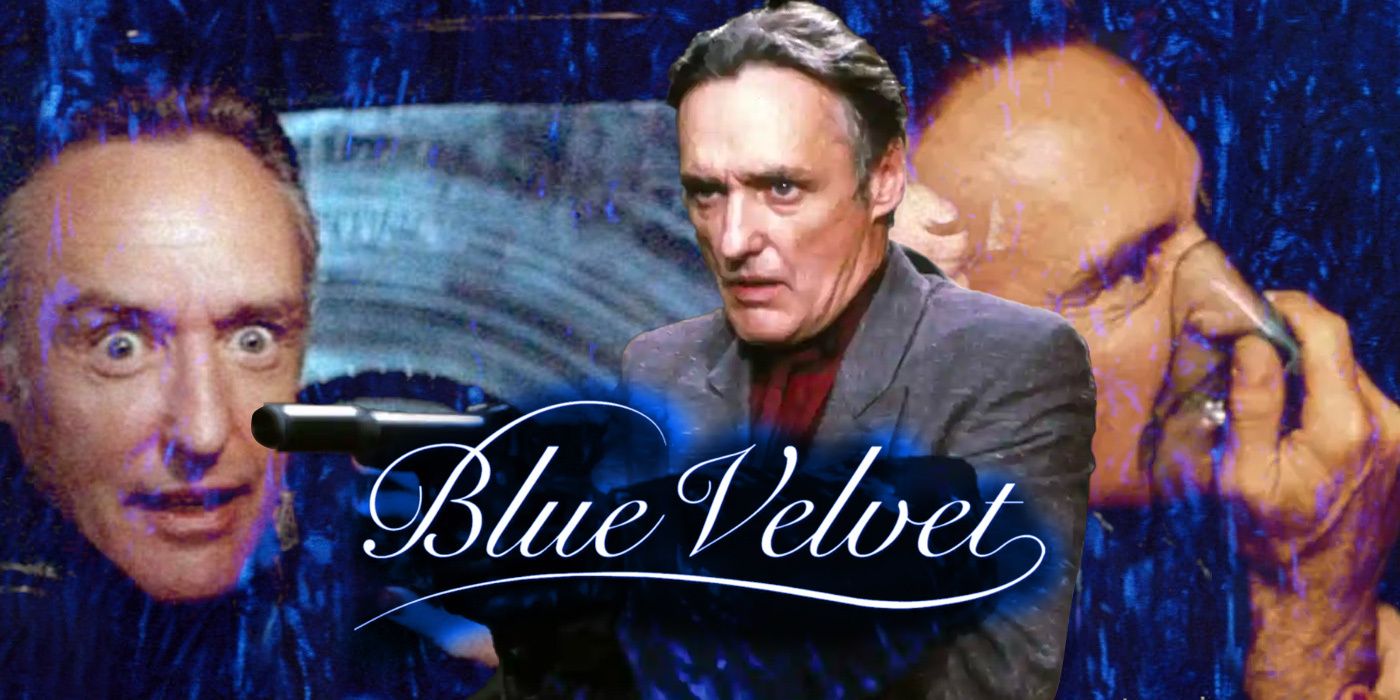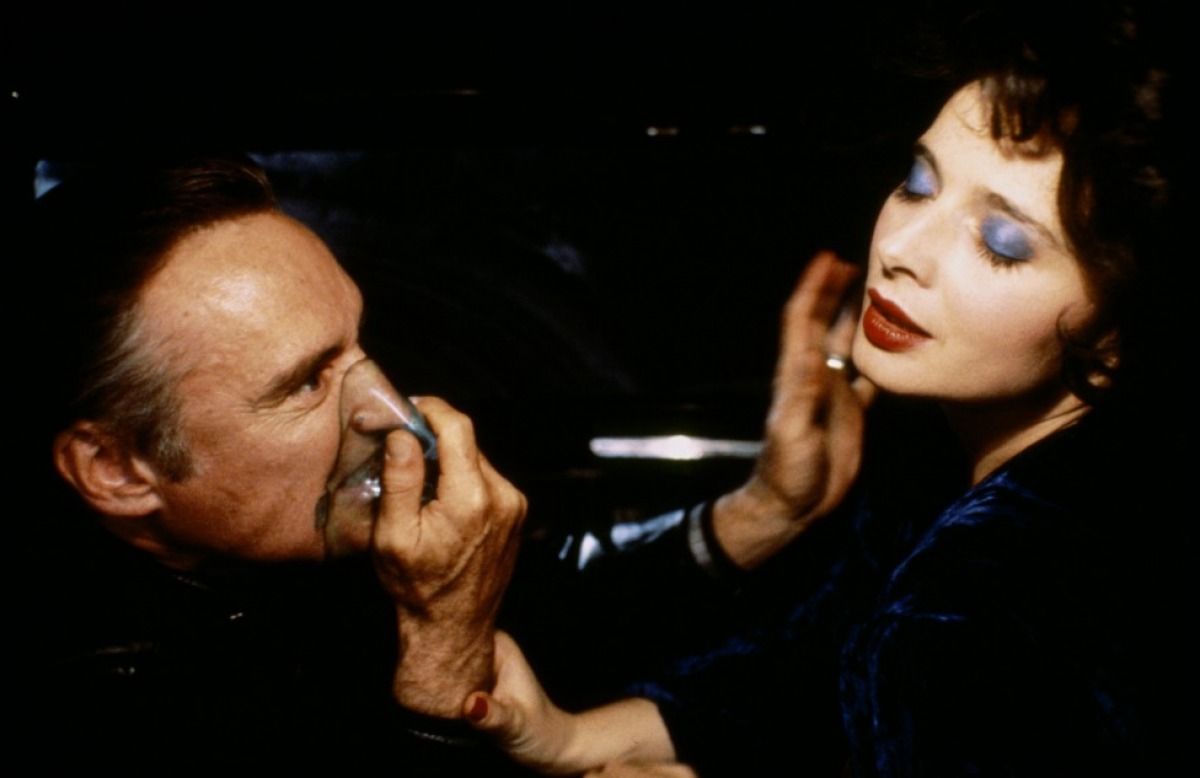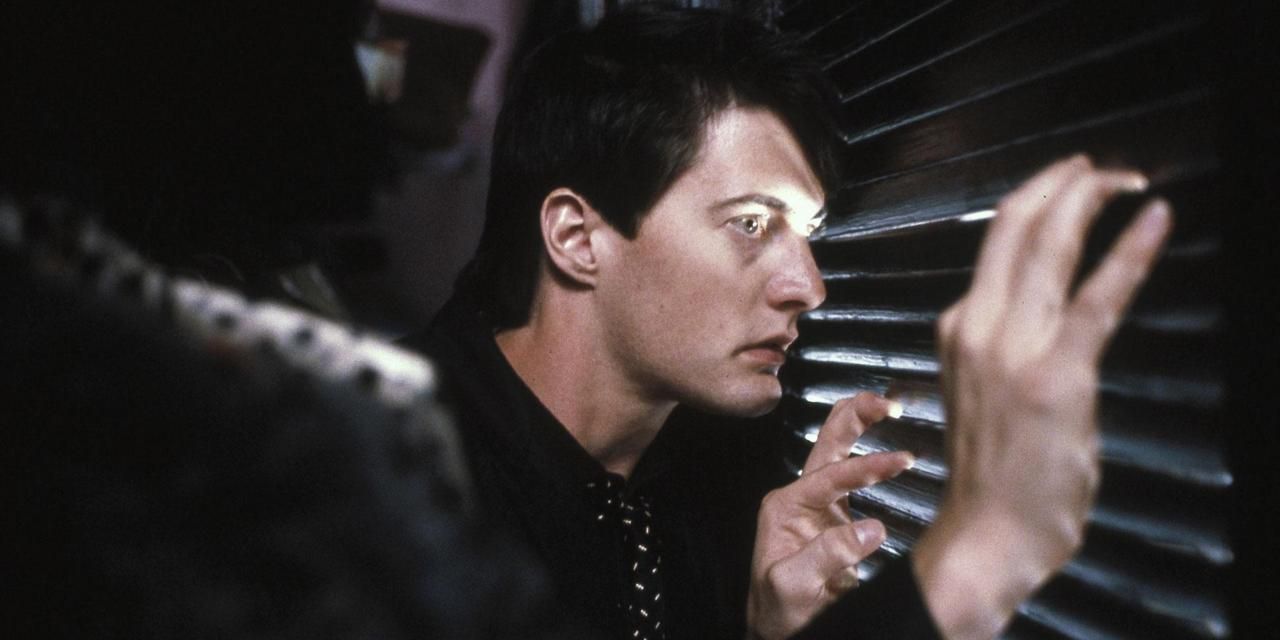Blue Velvet follows amateur sleuth Jeffrey Beaumont (Kyle MacLachlan) as he uncovers details surrounding the life of club singer Dorothy Vallens (Isabella Rossellini). When Jeffrey finds and hands in a severed ear to the local police department, he catches wind of a case investigating Dorothy for murder. To find out more, Jeffrey sneaks into Dorothy’s apartment where he witnesses scenes of obscene violence at the hands of Frank Booth (Dennis Hopper). Jeffrey comforts Dorothy before they become entangled in a relationship. Subsequently, Jeffrey is found by Frank, leading to a frightening sequence wherein he is taken on a violent “joyride” by Frank and his terrifying friends which culminates in Jeffrey being beaten and left for dead.
It’s clear that Frank is an erratic, aggressive individual who is obsessed with Dorothy, but our immediate understanding of his motives don’t dig much deeper than that. Why does Frank become equally obsessed and incensed by Jeffrey as he does Dorothy? On one hand, the argument could be made that it is jealousy based in a sense of ownership over Dorothy, particularly as this theme is mirrored by Sandy Williams (Laura Dern) and her boyfriend Mike (Ken Stovitz). However, it also seems that notions of masculinity, internalized homophobia, and repression play a significant role in shaping Frank’s behavior, as well.
We see desire and envy play out between Frank and his more effeminate male counterparts at various stages throughout the plot. There’s Ben (Dean Stockwell), the effete criminal with a painted face, and Jeffrey, who conjures the image of a modern type of masculinity -- tender, inquisitive, and un-macho. (At one point in the film, Sandy goes as far as mistakenly calling Jeffrey a “neat girl.”) Contrastingly, Frank upholds a traditional and old-school sense of masculinity, although there are times when it appears he doesn’t want to. He demands Dorothy dominate and degrade him, before changing his mind and becoming aggressive towards her for it. He is hand-fed and serenaded by Ben while sharing longing, meaningful eye contact with him before he bursts out of the fantasy and continues his reign of terror on the film’s protagonist. He repeatedly calls Jeffrey pretty, kisses him, and requests that Jeffrey feels his muscles before beating him and dumping his unconscious body in the countryside. Frank appears to tease with what he wants before reconnecting with who or what he believes he should be, according to his own notions of manhood and sexuality. Every time he gets too close, he pulls back with brutality.
The imagery used in the film is reminiscent of the camp and cabaret throughout. In an intimate moment shared between Frank and Ben, they lip-sync a song to one another in a way that is evocative of drag. The song -- “In Dreams” by Roy Orbison -- is a love song addressed to an unreachable lover: “In dreams I walk with you; In dreams I talk to you; In dreams you're mine all of the time; We're together in dreams, in dreams.” Frank’s face is tear-streaked throughout the serenade, before seemingly being overcome with rage. He cuts the song off midway through to resume his tormenting of Dorothy and Jeffrey. He can’t allow himself to get too close to what he wants without being enraged, pulling the veil of traditional masculinity and heterosexuality back over his face.
The all-pink room, belonging to Ben, where this scene takes place is referred to as “Pussy Heaven.” Throughout the film, Frank refers to Jeffrey as a pussy in a derogatory manner. While it is perhaps not uncommon for aggressive people to resort to name-calling, it is worth noting that the two men who are objects of Frank’s obsession, Jeffrey and Ben, are the only two people he refers to as “pussies.” There is this notion that the two men he appears to desire throughout the film both somehow belong to this same group in his eyes. Given the nature of the insult -- “pussy” to mean someone who is weak or frightened -- it appears that Frank is trying to posture his hyper-macho identity as a contrast against his perception of the two less traditionally masculine men. He expresses his animosity towards the men he desires by verbally abusing them, creating this sense that he is different or “other” from this group. But despite this, being surrounded by them is still poised to be “heaven” to him.
At various points throughout the film, Frank is seen to inhale a gas from a tank. In an interview with Dennis Hopper in 2002 for the DVD release of Blue Velvet, Hopper revealed that the drugs in the tank that Frank uses before his acts of violence to be amyl nitrate. Amyl nitrate is typically branded as the legal-high “poppers,” which is popularised on the gay circuit as an enhancer for sexual pleasure and a body-high. We first see Frank use amyl nitrate during our introduction to the character, when he enters Dorothy’s apartment, but subsequently we see it being used before he kisses and beats Jeffrey, and again before he tries to shoot him at the climax of the movie. It is clear that Frank gets off on violence; however the use of poppers acts almost as a knowing wink to the gay viewer.
The “joyride” sequence ends with Jeffrey being dragged out of the car by Frank and his posse. As he is restrained by Frank’s partners in crime, Frank tells him, “You’re just like me.” What Frank means by this isn’t explicitly established, but the homoerotic subtext indicates that perhaps Frank is suggesting that Jeffrey, too, is plagued by internalised homophobia and toxic masculinity – or simply, in fact, that he is also gay. While Jeffrey is held, Frank sings “In Dreams,” the song previously shared between him and Ben, to him. Frank applies scarlet lipstick to his own mouth before kissing Jeffrey all over his mouth and face, creating a simulation of a “Chelsea smile” out of makeup stains. Interestingly, the color of lipstick that Frank is wearing does not appear to be quite the same shade that Dorothy wears -- it is, presumably, either Frank’s own lipstick or the lipstick Ben was wearing in the earlier scene.
In between kisses, Frank repeatedly calls Jeffrey “pretty.” The only time we hear Frank give a compliment (if it can be called such) at this point is when he lovingly describes Ben as “suave” to his face. After this, he begins a monologue, saying he will send Jeffrey a love letter, “a bullet from a fucking gun.” He describes the love letter as a death sentence, sending Jeffrey “straight to hell.” After this proclamation, Frank goes on to flex his arms, emulating a masculine pin-up while asking Jeffrey to feel his muscles and if he likes what he sees. “In Dreams” continues to play in the background – this time, the song is not stopped before it reaches the final refrain: “It's too bad that all these things can only happen in my dreams.” Perhaps the things that Frank wishes could happen outside of his dreams involve the ability to connect emotionally with Ben, or with Jeffrey, but the web of repression he has become tangled up in creates a barrier in actualizing such things. At this point in the song, Frank breaks down in a rage and beats Jeffrey before abandoning him. He indulges himself in his homoerotic fantasies before it becomes too real for him again, and he flies into a fit of rage and aggression.
The story culminates with Jeffrey finding Dorothy’s previously abducted husband, Don Vallens (Dick Green), dead in her apartment, along with a detective known as the Yellow Man (Fred Pickler). Jeffrey sharply figures out that Frank is on his way to the apartment when he spots him approaching the building, dressed in what almost appears like hyper-masculine drag -- fake facial hair and an oversized suit. To get away from Frank, Jeffrey is forced to quite literally hide in the closet for his safety. When Frank arrives on the scene, he calls out for Jeffrey using a variety of names ranging from “stupid fuck” (which he only otherwise uses to refer to Dorothy) to “pretty-pretty” to talking about his “cute little butt.” As Frank does this, he seems to become excitable and starts to use amyl nitrate again, inhaling the gas before preparing to shoot Jeffrey and therefore giving him his final “love letter.” Eventually, Frank realizes Jeffrey is literally in the closet, and prepares to shoot him. But instead, when the closet doors are flung open, Jeffrey emerges from in between Dorothy’s sparkling stage clothes and shoots him directly through the skull. In his final moments, Frank appears to receive the “love letter” he was hoping for.
Frank’s resentment and lust towards the men who are less bound by repression is made starkly clear in his conflicting interactions with them throughout Blue Velvet. One moment, he wants to touch them and call them by pet names, the next he is abusive and aggressive, mirroring his internal conflict between who he wants to be and who he believes he should be. Much of Frank Booth’s heinous barbarity could be explained by this conflict. Blue Velvet creates an intoxicating commentary through its narrative on the damage caused by repression, heteronormativity, and internalized hatred – and how it can enact itself through male violence when it goes unchecked. As with Frank Booth, sometimes acting as someone you’re not can lead to you losing yourself and taking on a new persona, regardless of how hideous.



